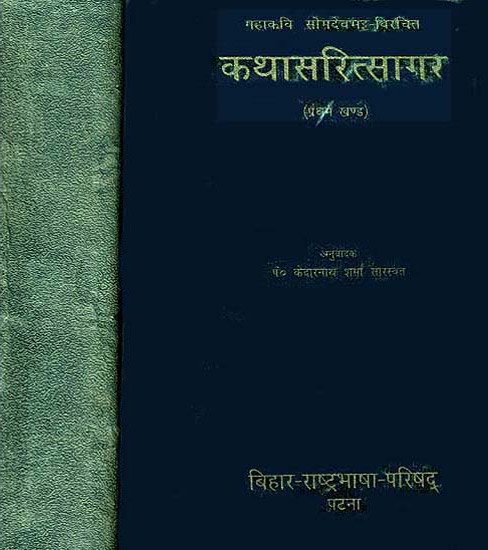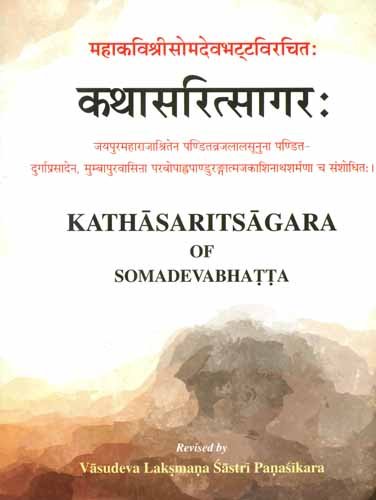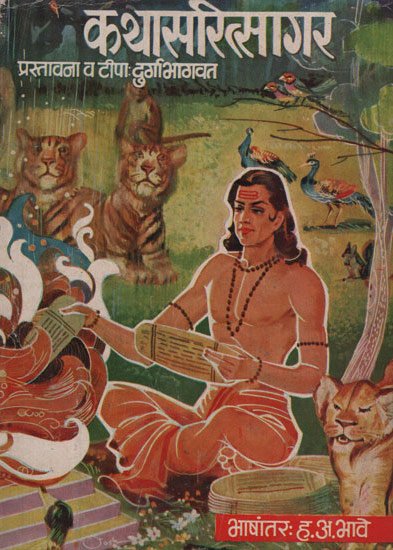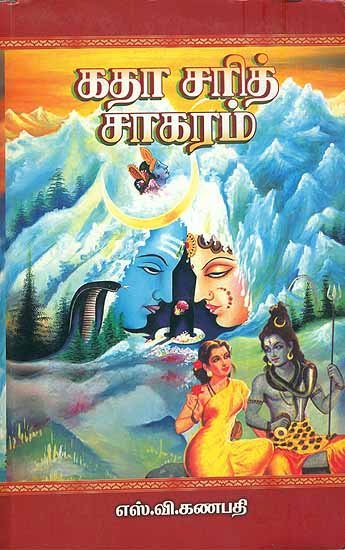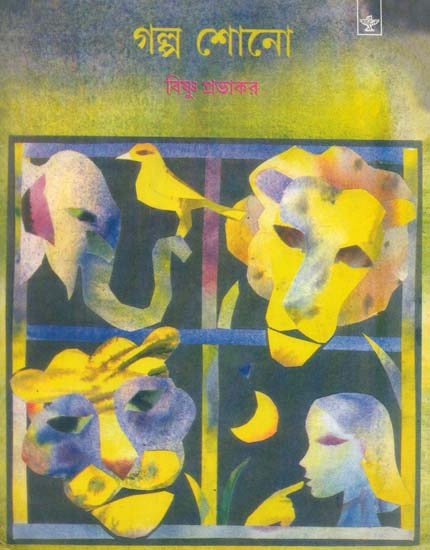Kathasaritsagara [sanskrit]
by C. H. Tawney | 2014 | 226,424 words | ISBN-13: 9789350501351
The Sanskrit edition of the Kathasaritsagara referencing the English translation and grammatical analysis. Written by Somadeva and dating from the 12th century, the Kathasaritsagara (or Katha-sarit-sagara) represents an epic legend narrating the adventures of Naravahanadatta as he strives to become the destined emperor of the Vidyadharas. Alternative titles: (Kathāsaritsāgara, कथासरित्सागर, Kathā-sarit-sāgara)
Verse 9.4.135
तदेवमीदृशं देव विचित्रं चेष्टितं विधेः ।
सुकृती चानुभूयैव दुःखम् अप्य् अश्रुते सुखम् ॥ १३५ ॥
tadevamīdṛśaṃ deva vicitraṃ ceṣṭitaṃ vidheḥ |
sukṛtī cānubhūyaiva duḥkham apy aśrute sukham || 135 ||
The English translation of Kathasaritsagara Verse 9.4.135 is contained in the book The Ocean of Story by C.H. Tawney. This book is available online or you could buy the latest edition:
Read online Buy now! The English translation by C.H. Tawney (2014)
Glossary of Sanskrit terms
Note: This extracts Sanskrit terms and links to English definitions from the glossary, based on an experimental segmentation of verse (9.4.135). Some terms could be superfluous while some might not be mentioned. Click on the word to show English definitions.
Tada, Vami, Vamin, Idrish, Idrisha, Deva, Vicitram, Vicitra, Ceshtita, Vidhi, Sukrit, Sukriti, Sukritin, Anubhuya, Duhkham, Duhkha, Ashruta, Ashruti, Sukham, Sukha,
Analysis of Sanskrit grammar
Note: this is an experimental feature and only shows the first possible analysis of the Sanskrit text (Kathasaritsagara Verse 9.4.135). If the system was successful in segmenting the sentence, you will see of which words it is made up of, generally consisting of Nouns, Pronouns, Verbs, Participles and Indeclinables. Click on the link to show all possible derivations of the word.
- Line 1: “tadevamīdṛśaṃ deva vicitraṃ ceṣṭitaṃ vidheḥ ”
- tade -
-
tadā (noun, feminine)[nominative dual], [vocative single], [vocative dual], [accusative dual]tada (noun, masculine)[locative single]tada (noun, neuter)[nominative dual], [vocative dual], [accusative dual], [locative single]
- vamī -
-
vami (noun, feminine)[compound], [adverb], [nominative dual], [vocative dual], [accusative dual]vami (noun, masculine)[compound], [adverb], [nominative dual], [vocative dual], [accusative dual]vamī (noun, feminine)[compound], [adverb], [nominative single], [vocative single]vamin (noun, masculine)[compound], [adverb], [nominative single]vamin (noun, neuter)[compound], [adverb], [nominative single], [vocative single], [accusative single]
- īdṛśam -
-
īdṛśa (noun, masculine)[adverb], [accusative single]īdṛśa (noun, neuter)[adverb], [nominative single], [accusative single]īdṛśā (noun, feminine)[adverb]īdṛś (noun, feminine)[accusative single]īdṛś (noun, masculine)[accusative single]
- deva -
-
deva (noun, masculine)[compound], [vocative single]deva (noun, neuter)[compound], [vocative single]devan (noun, masculine)[compound]√div (verb class 1)[imperative active second single]
- vicitram -
-
vicitram (indeclinable)[indeclinable]vicitra (noun, masculine)[adverb], [accusative single]vicitra (noun, neuter)[adverb], [nominative single], [accusative single]vicitrā (noun, feminine)[adverb]
- ceṣṭitam -
-
ceṣṭita (noun, masculine)[adverb], [accusative single]ceṣṭita (noun, neuter)[adverb], [nominative single], [accusative single]ceṣṭitā (noun, feminine)[adverb]√ceṣṭ -> ceṣṭita (participle, masculine)[adverb from √ceṣṭ]√ceṣṭ -> ceṣṭita (participle, neuter)[adverb from √ceṣṭ]√ceṣṭ -> ceṣṭitā (participle, feminine)[adverb from √ceṣṭ]√ceṣṭ -> ceṣṭita (participle, masculine)[accusative single from √ceṣṭ]√ceṣṭ -> ceṣṭita (participle, neuter)[nominative single from √ceṣṭ], [accusative single from √ceṣṭ]
- vidheḥ -
-
vidhi (noun, feminine)[ablative single], [genitive single]vidhi (noun, masculine)[ablative single], [genitive single]√vidh (verb class 6)[optative active second single]√vidh (verb class 6)[optative active second single]
- Line 2: “sukṛtī cānubhūyaiva duḥkham apy aśrute sukham ”
- sukṛtī -
-
sukṛt (noun, neuter)[nominative dual], [vocative dual], [accusative dual]sukṛti (noun, feminine)[nominative dual], [vocative dual], [accusative dual]sukṛti (noun, masculine)[nominative dual], [vocative dual], [accusative dual]sukṛtin (noun, masculine)[nominative single]
- cā -
-
ca (indeclinable conjunction)[indeclinable conjunction]ca (noun, masculine)[compound], [vocative single]ca (noun, neuter)[compound], [vocative single]cā (noun, feminine)[nominative single]
- anubhūyai -
-
anubhūya (indeclinable)[indeclinable]
- aiva -
-
√i (verb class 2)[imperfect active first dual]
- duḥkham -
-
duḥkham (indeclinable)[indeclinable]duḥkha (noun, masculine)[adverb], [accusative single]duḥkha (noun, neuter)[adverb], [nominative single], [accusative single]duḥkhā (noun, feminine)[adverb]
- Cannot analyse apy*aś
- aśrute -
-
aśruta (noun, masculine)[locative single]aśruta (noun, neuter)[nominative dual], [vocative dual], [accusative dual], [locative single]aśrutā (noun, feminine)[nominative dual], [vocative single], [vocative dual], [accusative dual]aśruti (noun, feminine)[vocative single]
- sukham -
-
sukham (indeclinable)[indeclinable]sukha (noun, masculine)[adverb], [accusative single]sukha (noun, neuter)[adverb], [nominative single], [accusative single]sukhā (noun, feminine)[adverb]
Other editions:
Also see the following editions of the Sanskrit text or (alternative) English translations of the Kathasaritsagara Verse 9.4.135
Kathasaritsagar
by Kedarnath Sharma Saraswat (2005)
The Only Edition with the Sanskrit Text and its Hindi Translation (An Old and Rare Book) Set of 3 Vol.
Buy now!
Kathasaritsagara of Somadeva Bhatta (Sanskrit Text Only)
by Vasudeva Laksmana Sastri (2013)
Katha Sarit Sagar in Marathi
by H. A Bhave (1995)
Set of 5 Volumes; Published by Varada Books, Pune. 2256 pages (Throughout B/W Illustrations).
Buy now!
Katha Sarit Sagara (Tamil)
by S. V. Ganapati (எஸ். வி. கணபதி) (2014)
[கதா சரித் சாகரம்] Published by Alliance Publications.
Buy now!
Galpa Shono
by Abhijit Chattopadhyay (2014)
[গল্প শোনো] Galpa Shono: Bengali Translation of 'Suno Kahani From Katha Sarit Sagar'; 9788126015436; Published by Sahitya Akademi, Delhi.
Buy now!Preview of verse 9.4.135 in Bengali sript:
তদেবমীদৃশং দেব বিচিত্রং চেষ্টিতং বিধেঃ ।
সুকৃতী চানুভূযৈব দুঃখম্ অপ্য্ অশ্রুতে সুখম্ ॥ ১৩৫ ॥
![Kathasaritsagara [sanskrit] - book cover](/uploads/a/Katha-Sarit-Sagara.jpg)
